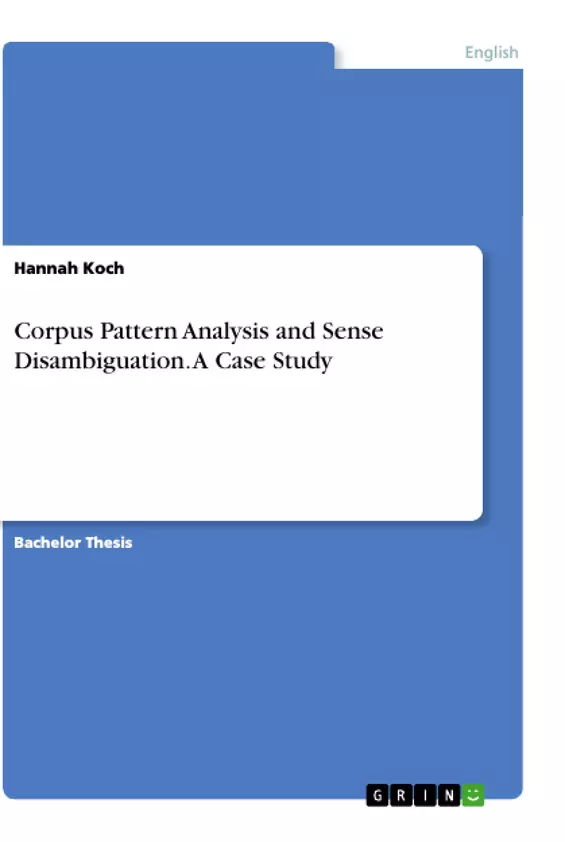
Corpus Pattern Analysis and Sense Disambiguation. A Case Study
Bachelorarbeit, 2018
78 Seiten, Note: 2,3
Leseprobe
Inhaltsverzeichnis (Table of Contents)
- Introduction
- Morphological Issues
- Suffixation
- The Suffix –ify
- Adjectives
- Suffixation
- Approaches to Lexical Analysis
- The Theory of Norms and Exploitation
- Pattern Dictionary of English Verbs
- Frame Semantics
- Word Sense disambiguation
- Valency
- Polysemy
- Collocation
- Colligation
- Semantic Preference
- Semantic Prosody
- The Theory of Norms and Exploitation
- Corpus Linguistics
- The British National Corpus
- The NOW Corpus
- Etymology and meaning
- Pretty
- Vivid
- Method and Analysis
- Analysis of to prettify
- Analysis of to vivify
- Conclusion
Zielsetzung und Themenschwerpunkte (Objectives and Key Themes)
This paper investigates the use and meaning of the verbs "to prettify" and "to vivify", derived from adjectives with the suffix "-ify", in the NOW Corpus. The research utilizes the "Theory of Norms and Exploitation" (TNE) by Patrick Hanks, examining the target words through the lens of his Pattern Dictionary approach and John Sinclair's model of extended lexical units. This analysis aims to provide a comprehensive understanding of the different aspects and nuances of their meanings.
- Morphological analysis of the suffix "-ify" and its impact on the target words
- Application of the Theory of Norms and Exploitation (TNE) to understand verb meaning
- Comparison of the Pattern Dictionary approach and the model of extended lexical units
- Analysis of the target words "to prettify" and "to vivify" in the NOW Corpus
- Exploration of the relationship between morphology, meaning, and corpus data
Zusammenfassung der Kapitel (Chapter Summaries)
The introduction outlines the study's objective: to examine the use and meaning of the verbs "to prettify" and "to vivify" in context. It introduces the methodology employed, drawing upon the "Theory of Norms and Exploitation" (TNE) by Patrick Hanks and his Pattern Dictionary approach. The second chapter explores morphological aspects, focusing on suffixation and the "-ify" suffix, as well as the characteristics of adjectives. The third chapter delves into theories of lexical analysis, including the TNE, Frame Semantics, valency, polysemy, and the model of extended lexical meaning. Chapter four offers a brief overview of corpus linguistics, highlighting the British National Corpus and the NOW Corpus. Chapter five provides the etymology and meaning of the target words "to prettify" and "to vivify". The final chapter will present the findings of the analysis, evaluating the results and offering a concluding outlook on the study's effectiveness and potential for further research.
Schlüsselwörter (Keywords)
The core focus of this paper lies in the analysis of the target words "to prettify" and "to vivify" in the context of the NOW Corpus. The study utilizes the Theory of Norms and Exploitation (TNE), Pattern Dictionary of English Verbs, Frame Semantics, valency, polysemy, collocation, colligation, semantic preference, and semantic prosody. These keywords encapsulate the research's main themes and methods.
Frequently Asked Questions
What is the main goal of this linguistic case study?
The study aims to analyze the verbs "to prettify" and "to vivify" to see how they differ in meaning and use within specific contexts.
What is the "Theory of Norms and Exploitation" (TNE)?
Developed by Patrick Hanks, TNE explores how words have "normal" uses (norms) and how creative language "exploits" these patterns to create new meanings.
Which corpora were used for the analysis?
The research primarily utilizes the NOW Corpus and also references the British National Corpus (BNC).
What linguistic aspects are examined for the target verbs?
The analysis looks at collocations, colligations, semantic preference, semantic prosody, and valency.
How does the suffix "-ify" affect the target words?
The study explores how this suffix transforms adjectives (pretty, vivid) into verbs and how this morphological change impacts their semantic nuances.
Details
- Titel
- Corpus Pattern Analysis and Sense Disambiguation. A Case Study
- Hochschule
- Gottfried Wilhelm Leibniz Universität Hannover
- Note
- 2,3
- Autor
- Hannah Koch (Autor:in)
- Erscheinungsjahr
- 2018
- Seiten
- 78
- Katalognummer
- V1027140
- ISBN (eBook)
- 9783346430281
- ISBN (Buch)
- 9783346430298
- Sprache
- Englisch
- Schlagworte
- corpus pattern analysis sense disambiguation case study
- Produktsicherheit
- GRIN Publishing GmbH
- Preis (Ebook)
- US$ 26,99
- Preis (Book)
- US$ 31,99
- Arbeit zitieren
- Hannah Koch (Autor:in), 2018, Corpus Pattern Analysis and Sense Disambiguation. A Case Study, München, Page::Imprint:: GRINVerlagOHG, https://www.diplomarbeiten24.de/document/1027140
- Autor werden
- Ihre Optionen
- Vertriebskanäle
- Premium Services
- Autorenprofil
- Textarten und Formate
- Services für Verlage, Hochschulen, Unternehmen

- © GRIN Publishing GmbH.
- Alle Inhalte urheberrechtlich geschützt. Kopieren und verbreiten untersagt.
- info@grin.com
- AGB
- Open Publishing
Der GRIN Verlag hat sich seit 1998 auf die Veröffentlichung akademischer eBooks und Bücher spezialisiert. Der GRIN Verlag steht damit als erstes Unternehmen für User Generated Quality Content. Die Verlagsseiten GRIN.com, Hausarbeiten.de und Diplomarbeiten24 bieten für Hochschullehrer, Absolventen und Studenten die ideale Plattform, wissenschaftliche Texte wie Hausarbeiten, Referate, Bachelorarbeiten, Masterarbeiten, Diplomarbeiten, Dissertationen und wissenschaftliche Aufsätze einem breiten Publikum zu präsentieren.
Kostenfreie Veröffentlichung: Hausarbeit, Bachelorarbeit, Diplomarbeit, Dissertation, Masterarbeit, Interpretation oder Referat jetzt veröffentlichen!
- GRIN Verlag GmbH
-
- Nymphenburger Str. 86
- 80636
- Munich, Deutschland
- +49 89-550559-0
- +49 89-550559-10
- info@grin.com
-









